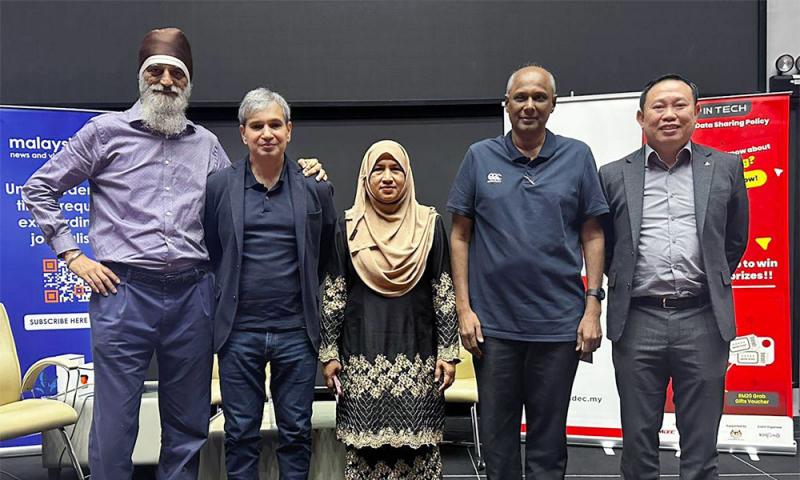Data Literacy in today's Digital Age
In 2022, the Government launched the National Data Sharing Policy (NDSP), a visionary policy that transcends boundaries, encompassing the public sector, the private sector, and the Rakyat. This policy holds the key to fostering a data sharing environment that is not only conducive but transformative.
To raise awareness and gather valuable feedback, we have initiated the NDSP Series – a collaborative effort by the Malaysia Digital Economy Corporation (MDEC), Malaysiakini, and Digital News Asia (DNA), with the support of the Ministry of Digital (MD).
This series aims to educate the public about the benefits and challenges of data sharing while gathering opinions and suggestions to enhance the policy and its implementation. Your active participation in these discussions will be instrumental in shaping the data sharing practices in Malaysia, leading us toward a secure and dynamic digital world.
The 8th Episode of the National Data Sharing Policy, Karamjit Singh, CEO of Digital News Asia, engaged in a discussion with Kiranjit Singh, Regional Head, APAC, Ipsos Strategy3 and Dr Hazirah Bee, Senior Lecture, UNIMY at Brickfield Asia College (BAC).
Data Sharing Challenges and Opportunities: Navigating Silos, Enhancing Customer Experiences, and Addressing Legislative Concerns.
The discussion commenced with welcome remarks delivered by representatives from MDEC, Dr. Karl, and Mr. Thillai Raj, Chief Technology Officer of BAC. Karamjit Singh initiated the proceedings by directing the first question of the day to Dr. Hazirah, probing the most significant gap in data literacy. Addressing the issue, she emphasised the uncertainty surrounding the data at hand, citing a lack of awareness, the need for a comprehensive understanding of the data, the importance of training, and the necessity of safeguarding information before dissemination. Kiranjit Singh expanded on this, stressing that in today's era, the ability to not only comprehend and derive insights from data but also critically analyse, evaluate validity, establish trust, and formulate individual opinions and conclusions are paramount when presenting data.
Kiranjit provided insights and recommendations, emphasising the necessity of extensive data sharing to elevate customer experiences, particularly in government and public services. He highlighted the current challenge where many government systems operate in silos, collecting data independently; “The importance of increased data sharing and integration across public sector services to enhance service quality.”
In response, Karamjit directed the next question to viewers, inquiring about the top three risks or concerns related to data sharing in Malaysia and seeking perspectives on how legislation could address these potential risks.
Mitigating Risks in Data Sharing: Safeguarding Privacy, Building Trust, and Ensuring Data Quality
Dr. Hazirah addressed the question, expressing concerns about data sharing vulnerabilities exploited by scammers who employ deceptive techniques, such as false tax claims leading to bankruptcy threats. To mitigate these risks, she highlighted the importance of data privacy and security, suggesting strategies such as categorising data and adhering to rules and regulations before sharing it online. Her three identified concerns revolved around data privacy, specifically the safeguarding of sensitive information, the challenge of establishing trust in data sharing processes, and the critical issue of data quality and accuracy, which can impact the reliability of analyses.
Kiranjit responded by proposing a shift in focus to economics, highlighting various factors such as inflation, unemployment, and consumer sentiment that influence the assessment of interest rates. “We must stress the significance of understanding how people utilise and present data and the transformative impact of these factors”
Empowering Action: The Intersection of Cost Concerns, Business Dynamics, and Policy Shaping
In response, Dr Hazirah emphasised the need for a structured approach, suggesting steps like incident response handling and audits. He discussed preventive measures to ensure the beneficial utilisation of data, indicating a strategic perspective on maximising the advantages derived from data usage.

In conclusion, Karamjit underlined the pivotal role of cost considerations and business dynamics in shaping policies. He underscored the importance of addressing concerns and understanding the financial implications before a policy is enacted. By recognising that individuals possess the power to influence and shape policies, Karamjit encouraged proactive engagement and empowerment within the community. This insight serves as a reminder that collective action and informed decision-making can contribute significantly to the formulation of effective policies that align with both economic considerations and business needs.
Watch the full webinar HERE, on Data Literacy in Today’s Digital Age.
This article is provided by KiniEvents
RM12.50 / month
- Unlimited access to award-winning journalism
- Comment and share your opinions on all our articles
- Gift interesting stories to your friends
- Tax deductable
